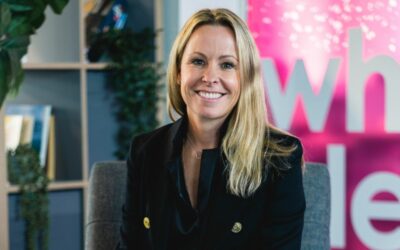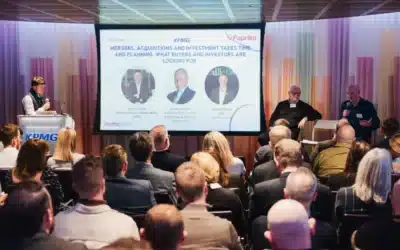Guy Letts is the co-founder and CEO of CustomerSure, a specialist in software platforms to attract and retain more customers.
He launched the company in 2010 following senior roles at Logica, Speedwing and Sage.
Here, he shares his career journey, tips and advice.
How did you first get into your industry?
My computer science teacher gave me wise advice to study engineering at university to widen my career options. I ended up back in software, but the engineering skills have been a great asset.
There was no Internet when I started job hunting – just a directory of companies offering graduate opportunities. The 21-year-old me was seduced by the idea of ‘well logging’ with Schlumberger (data recording in the desert), or fast-tracking as a production manager at Mars. But the highest-paid jobs were also the most competitive, so I worked the odds and went for a less exotic role at a software company in London.
Luckily it led to a series of hugely enjoyable projects – travelling widely (though in my case only ever to industrial suburbs) and working with manufacturers of cars, beer, chocolate, crisps, cosmetics and pharmaceuticals. The most rewarding part was learning from all the experienced people I encountered.
I guess the lesson is just start wherever you can, then the experience, contacts and personal reputation you acquire will open up new opportunities.
What do you love about your job?
I’ve always loved doing the same thing – working with great colleagues to make customers happy. Any job is more enjoyable when you have good people alongside, people who share the same values and who are good at what they do.
For me, job satisfaction is greatest when customers tell us how much of a positive impact our product is making on their business because that’s what we work so hard to achieve.
Who – or what – has inspired you in your career?
Andy, my first project manager. He’s not famous, but he should be. He just quietly led by example. He was the hardest worker, the best encourager, the wisest at managing relationships, the shrewdest, calmest yet toughest negotiator, and as humble and kind as they come.
I remember always wanting to do my best work for fear of letting him down. He always kept a vision of the big picture, but he was rigorous and detailed too. Airport shops are full of leadership books nowadays, but Andy was an incredible role model and he absolutely nailed leadership without ever calling it that. People would walk through walls for him.
What are the biggest challenges about your job?
Perseverance. Overnight successes make the headlines, but in reality, they’re a small minority and it can be disheartening to compare yourself with them. For everyone else, in any industry, not just technology: success takes confidence, skill, determination, resilience, patience …and in 99% of cases, a minimum of 10 years.
When you’re growing a business from scratch, every year feels like there’s still a mountain to climb. To keep going, it really helps to look back and take comfort from how far you’ve already come.
What skills have been the most crucial to you succeeding in your career so far?
Listening. To my great embarrassment, it was years before I learnt that listening didn’t mean ‘waiting politely for the other person to finish so you could say your bit’. It probably shouldn’t have taken ‘listening skills’ training for me to realise this, but it was the single most useful course I’ve ever done.
It’s helped in sales, recruitment interviewing, requirements capture, commercial negotiations, and chairing tricky disciplinary appeals …in fact, I think I still benefit in every area of my work from those skills of listening, questioning, peeling back the layers, summarising and checking for understanding.
What was your first salary and what could someone getting into the industry expect to earn nowadays?
It made my day to get the offer letter, which was for £7,250. Amazingly, that was enough to get me on the housing ladder in London. It was a tiny studio, miles out, with a bus, train and tube commute, but it was a start. Google says a starter would earn upwards of £25k now.
What education or training would be most useful for someone looking to follow your career path?
It’s deceptively easy for an amateur to throw together software that looks good on the surface but a computer science qualification is a pre-requisite now. For commercial software, I was taught that quality means: validity (does it work correctly), resilience (does it always work), performance (do people get fed up waiting for it to work), usability (is it easy to use), maintainability (is it easy to fix), testability (is it easy to test)? And of course, security has to be at the core of everything, like letters through a stick of rock.
The best software engineers I’ve worked with also understand the hardware and the importance of software architecture, so look for courses that teach how the software works at the bits & bytes level, as well as how to use it productively at a high level. Once you’ve got the basic skills, experience is everything, so the next step is to join a company where there are good people to learn from – not gurus who hoard their knowledge, but generous people willing to share what they know, and who’ll be willing to spend time coaching and encouraging you.
Even today, when I face challenges, I find it useful to think of someone I’ve respected and ask myself ‘How would they handle this?’
What advice would you have for someone looking to follow your path?
Sometimes we’re faced with a choice: I can do (or say) the thing which advances me personally in this immediate situation, or I can do the right thing. Always do the right thing. Over the long term, acting with integrity is a better means of self-advancement than self-advancement.














